Google Pixel 9 Pro XL vs Samsung Galaxy S24 Ultra: Almost a draw

Intro
With the Pixel 9 Pro XL, Google is reinventing the flagship. The new ultra-premium flagship delivers sensible upgrades and positions the Pixel as a proper alternative to the iPhones and Galaxies of the world. Actually,
Which one should you consider?
Pixel 9 Pro XL vs Galaxy S24 Ultra differences:
| Pixel 9 Pro XL | Galaxy S24 Ultra |
|---|---|
| Aluminum frame | Titanium frame |
| 6.8-inch OLED HDR screen with 2,700 nits of peak brightness | 6.8-inch OLED screen with 2,500 nits of peak brightness |
| Triple camera setup (50MP main + 48MP ultra-wide + 48MP 5X telephoto) | Quad camera setup (200MP main + 12MP ultra-wide + 10MP 3X tele + 50MP 5X tele) |
| Google Tensor G4 chip (focus on AI and ML) | Snapdragon 8 Gen 3 chip on board (focus on raw performance) |
| Slightly larger 5,060mAh battery | Marginally smaller 5,000mAh battery |
| Slower wired (37W) but faster wireless (23W) charging | Faster wired (45W) but slower wireless charging (15W) |
| No stylus | S Pen stylus |
Table of Contents:
Design and Size
Premium as premium can get
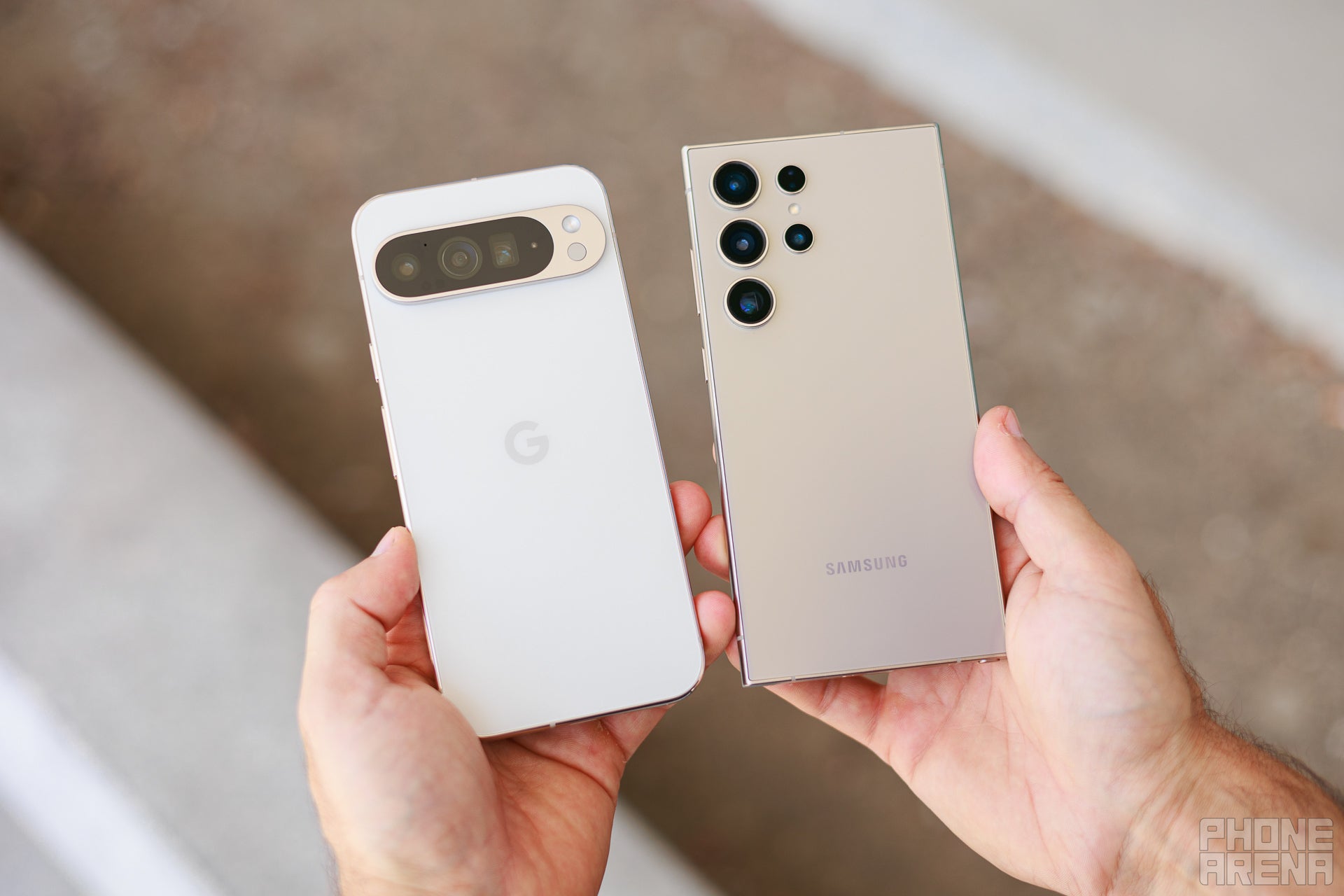

From a design perspective, we get an aluminum and mostly flat design with the Pixel 9 Pro XL, which is the clear design choice these days. From a visual standpoint, it follows the signature Pixel design style.
There’s a redesigned camera strip at the back, a bold moving away from the distinct 3D Visor look of previous Pixels. The rear back panel is a classy matte one, while the frame has that glossy look going for it. We dig that, it looks quite mature and classy.
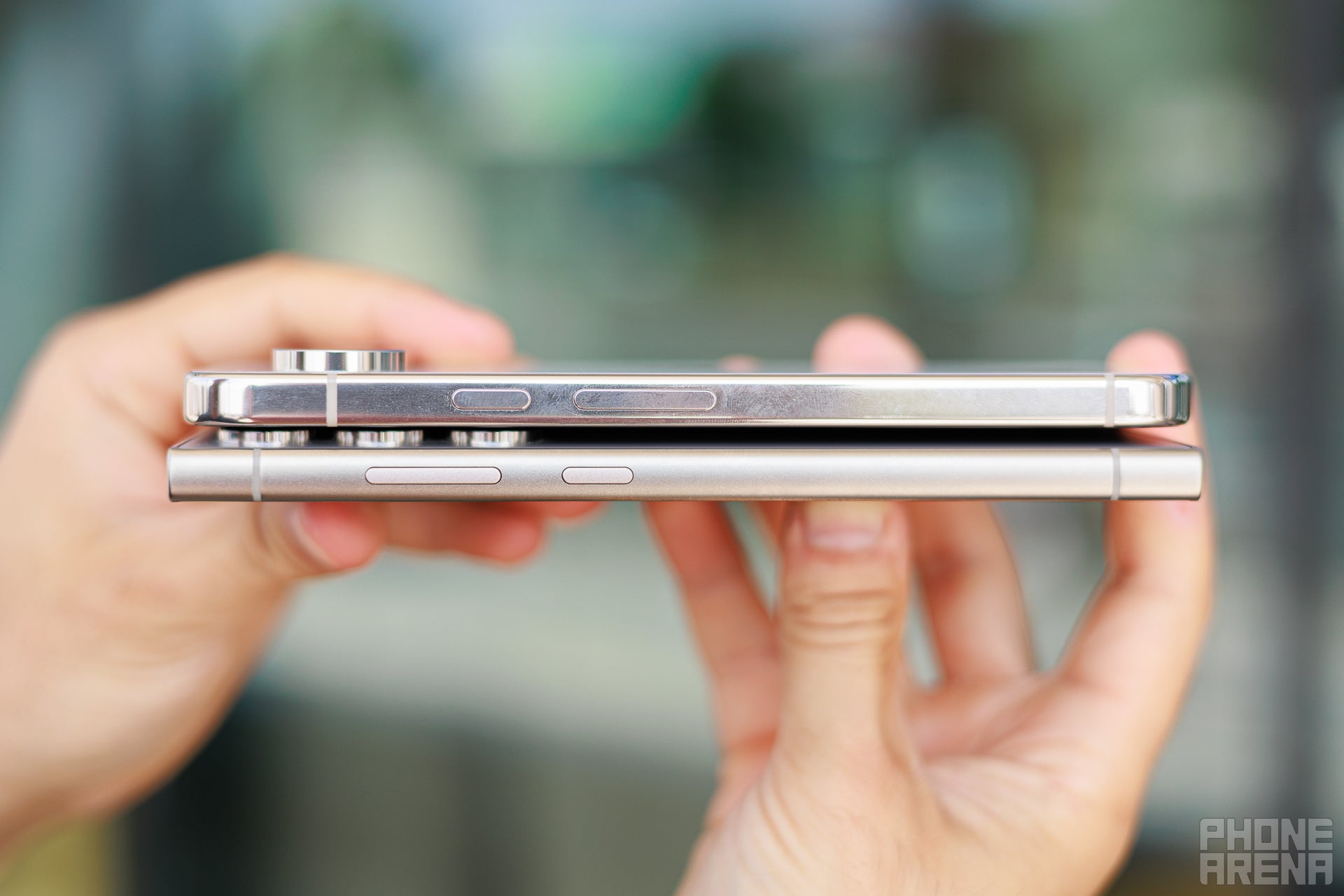

Meanwhile, the Galaxy S24 Ultra employs a mostly flat titanium frame, which still features an ever-so-slight curvature for enhanced ergonomics. It’s Samsung’s largest traditional phone released thus far in 2024, with a completely flat 6.8-inch screen up front. Of course, just like previous Galaxy devices, this one comes along with the S Pen tucked into its silo right out of the box.
The Pixel 9 Pro XL is lighter than the Galaxy S24 Ultra, but it’s slightly wider and taller. This essentially means that while the Galaxy S24 Ultra is technically the heavier phone, it’s slightly more single-hand friendly, as it is narrower.
Both phones match each other’s endurance against the elements with an IP68 water and dust resistance. This means you can dunk each phone for up to half an hour in up to 1.5m of water, and they’ll live to tell the tale.
Colors-wise, the Pixel 9 Pro XL arrives in Obsidian, Porcelain, Rose Quartz, and Hazel colors (black, white, pink, and green).
At the same time, the Galaxy S24 Ultra is available in Titanium Black, Titanium Gray, Titanium Violet, Titanium Yellow, Titanium Blue, Titanium Green, and Titanium Orange.
Display Differences
A few key differences
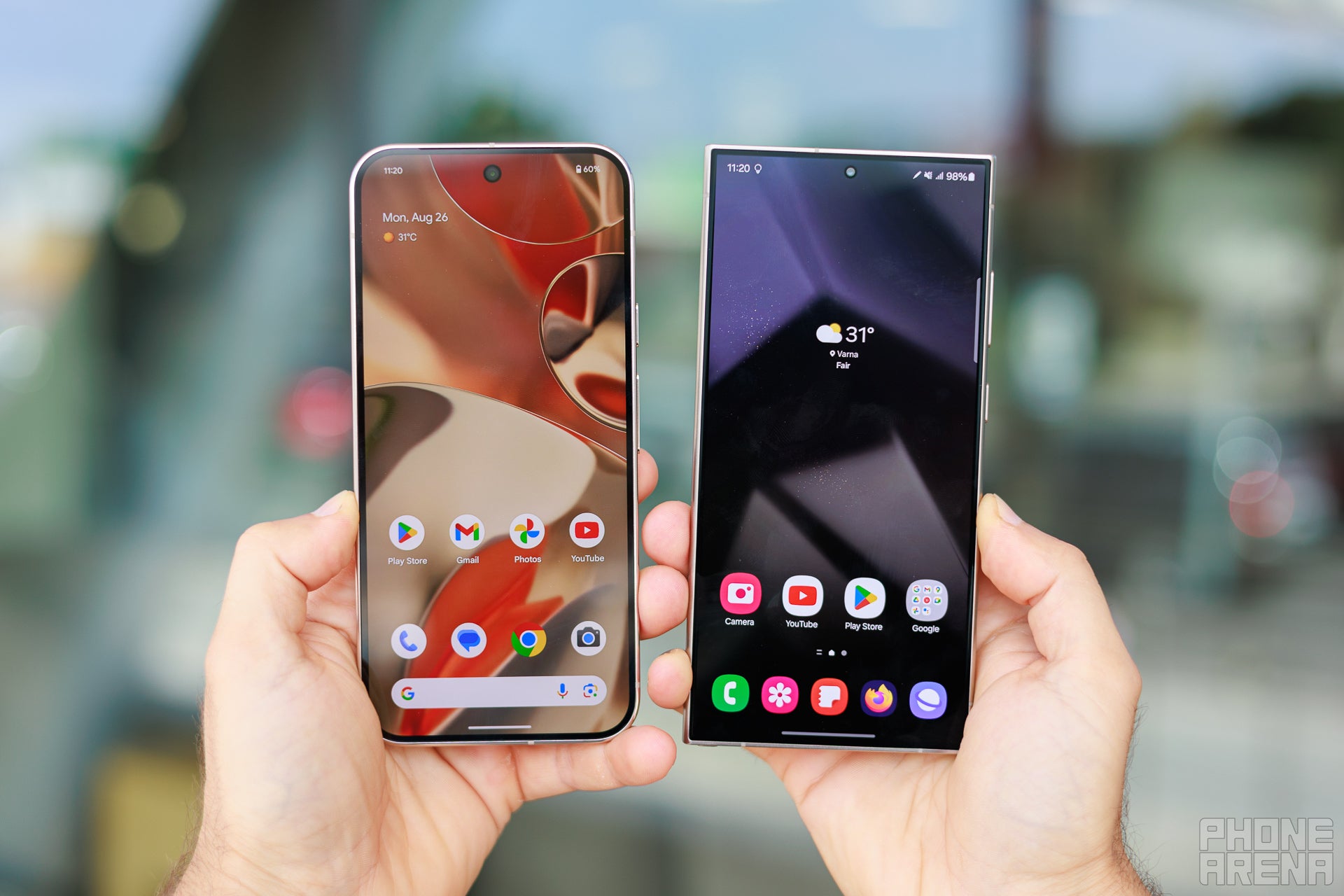

Although the displays of the two phones will differ slightly in terms of overall size, they aren’t that much different.
At the same time, the Galaxy S24 Ultra also comes with a 6.8-inch screen, also a QHD+ one with smooth 1-120Hz refresh rate. Samsung is also participating in the brightness wars, so its latest flagship can hit upwards of 2,500 nits of peak brightness in the right ambient conditions. However, that’s not enough to beat the new top Pixel.
As per our display benchmarking test, the Pixel 9 Pro XL crushes the Galaxy S24 Ultra in terms of peak brightness: we measured 2052 nits on the Google phone, while the Galaxy could only hit 1280 nits, which is a massive difference. However, the Galaxy has that anti-reflective coating over the display, which kind of evens things out.
However, the minimum brightness is lower on the Galaxy S24 Ultra, and the Pixel 9 Pro XL can’t really match it.
Regarding biometrics, the Pixel 9 Pro XL and the Galaxy S24 Ultra both come with a fast and accurate ultrasonic fingerprint scanner. That’s a major upgrade over the previous fingerprint iterations with older Pixels, which all had optical scanners (slow and not very accurate).
Performance and Software
Another episode of the “Tensor vs Snapdragon” drama
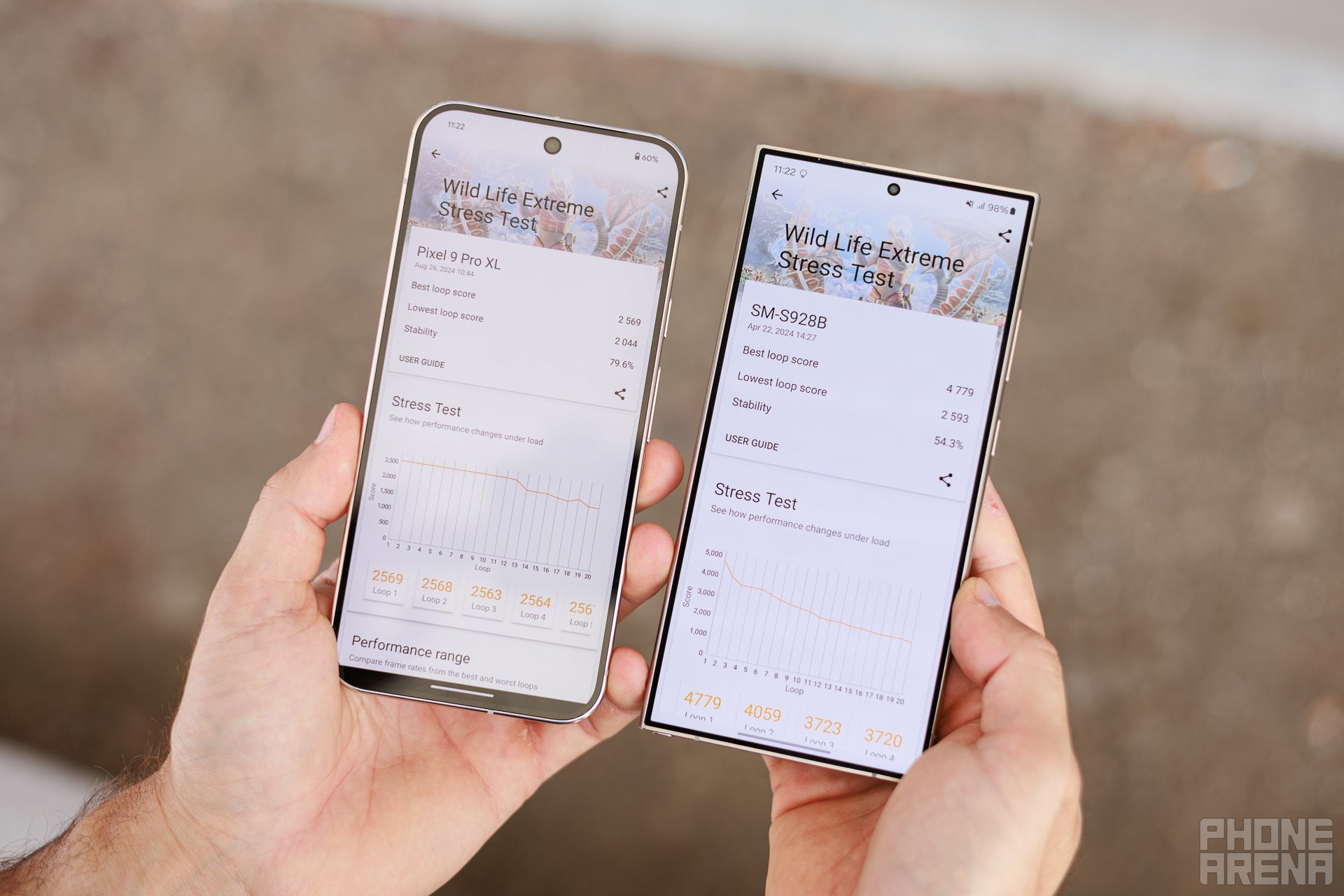

The Tensor G4 makes the rounds inside the Pixel 9 Pro XL.
Just like previous Tensor chips, this one is betting heavily on on-device AI and machine-learning, shifting the focus away from raw performance. AI is all the rage with the Tensor G4, delivering a specialized environment for all things artificial intelligence.
And indeed, all Pixel 9 devices arrive with Gemini Nano with multi-modality, which is exclusively run on the Tensor G4. Google says this one is the most capable on-device AI model, which is capable of not only understanding text and speech, but also images and audio.
| Tensor G4 | Snapdragon 8 Gen 3 | |
|---|---|---|
| Prime core | 1x Cortex-X4@3.1GHz | 1x Cortex-X4@3.3GHz |
| Performance cores | 3x Cortex-A720@2.37GHz | 3x Cortex-A720@3.15GHz 2x Cortex-A720@3.0GHz |
| Efficiency cores | 4x Cortex-A510@1.7GHz | 2x Cortex-A520@2.3GHz |
As per our synthetic benchmark tests, it’s the Galaxy S24 Ultra that decidedly takes the throne. Both in the CPU and GPU-centric tests, it’s the Snapdragon 8 Gen 3 inside the Galaxy phone that’s much faster. However, the Tensor G4 isn’t that far off in the Geekbench single-core test, but the Google chip steps off on the wrong foot in the gaming tests.
Performance Benchmarks:
There’s a massive amount of 16GB of RAM on the Pixel 9 Pro XL, more than enough to accommodate all on-device AI necessities. The Galaxy S24 Ultra comes along with 12GB of RAM, which is plenty-ish, but might not be quite future-proof given the massive hardware requirements of AI that will only grow in the coming years.
Storage-wise, the Pixel 9 Pro XL arrives with 128GB, 256GB, 512GB, and 1TB storage options, while the Galaxy S24 Ultra is available in 256GB, 512GB, and 1TB.
Both Samsung and Google now have a top-of-the-line seven-year software update policy in place. This means that the Pixel 9 Pro XL will be supported until 2031, which is just as long as the Galaxy S24 Ultra.
Camera
The era of AI photography is upon us


The Pixel 9 Pro XL is equipped with a 50MP primary camera that features an aperture of f/1.68 and a substantial sensor size of 1/1.31″.
Both the ultra-wide and 5X telephoto are 48MP cameras with fairly large apertures, measuring f/2.8 and f/1.7. Despite lacking dedicated cameras for those specific zooms, the Pixel 9 Pro XL boasts optical-quality zoom at both 2X and 10X, thanks to sensor-cropping and hybrid zoom.
The Pixel 9 Pro XL has a plethora of AI and software features on board: Pro controls, Add Me, Macro Focus, Night Sight, Astrophotography, Portrait Mode, Face Unblur, Long Exposure, Action Pan, Real Tone, Panorama, Top Shot, and Frequent Faces. Both devices also support the AI-powered Magic Editor, Magic Eraser, Best Take, Photo Unblur, Zoom Enhance, and Portrait Light.
In the case of the Galaxy S24 Ultra, we got the same camera as the one on the S23 Ultra… but with a twist. Instead of a 10MP periscope camera with 10X optical zoom, we got a 50MP telephoto with 5.0X optical zoom. This turned out to be an upgrade, as the device still hit the same 100X Space Zoom levels, but delivered arguably better zoom quality, which is key in such scenarios.
Main camera
The main differences are the details, the dynamics, and the color appearance here. Sharpness is superior with the Galaxy S24 Ultra, and so is the dynamics. The Pixel still crushes the shadows, whereas the Samsung phone delivers a less contrast-y look that delivers more data with both the highlights and shows.
Zoom Quality
At 3X, the Pixel relies on hybrid digital zoom, whereas the Galaxy has a dedicated telephoto camera for this specific level of zoom. For the most part, the Pixel does a fairly decent job, but it’s the Galaxy that’s our top choice thanks to the more realistic colors and sharper details. The Pixel is too warm and details are not as clean.
Moving to 5X, it’s definitely a draw. Both phones have dedicated 5X telephoto cameras, so the sharpness is exemplar in both shots. The only major differences here are the color temperature and the better dynamics on the Galaxy S24 Ultra, which doesn’t crush those shadows that much.
At 10X, it’s all Samsung. The sample taken with the Galaxy S24 Ultra looks mega, with extremely clean detail that just pops out. The Pixel also does an outstanding job, but the details are fuzzier here.
Ultra-wide Camera
Both phones have fairly wide ultra-wide cameras (which is kind of the point here), but the Pixel fits a little more scene in the frame, thanks to the 123-degree field-of-view against the Galaxy’s 120-degree one.
At night, both are fairly decent, with comparable dynamics and sharpness. The Pixel 9 Pro XL tips the scales in its favor due to the slightly wider field of view, though.
Selfies
Major differences here. The selfie taken with the Galaxy S24 Ultra is generally the one we like more, thanks to the warmer and more eye-pleasing facial colors achieved with our subject, as well as the acceptable amount of sharpness. The Pixel goes for a more contrast-y look and slightly colder colors, which could be an acquired taste.
Battery Life and Charging
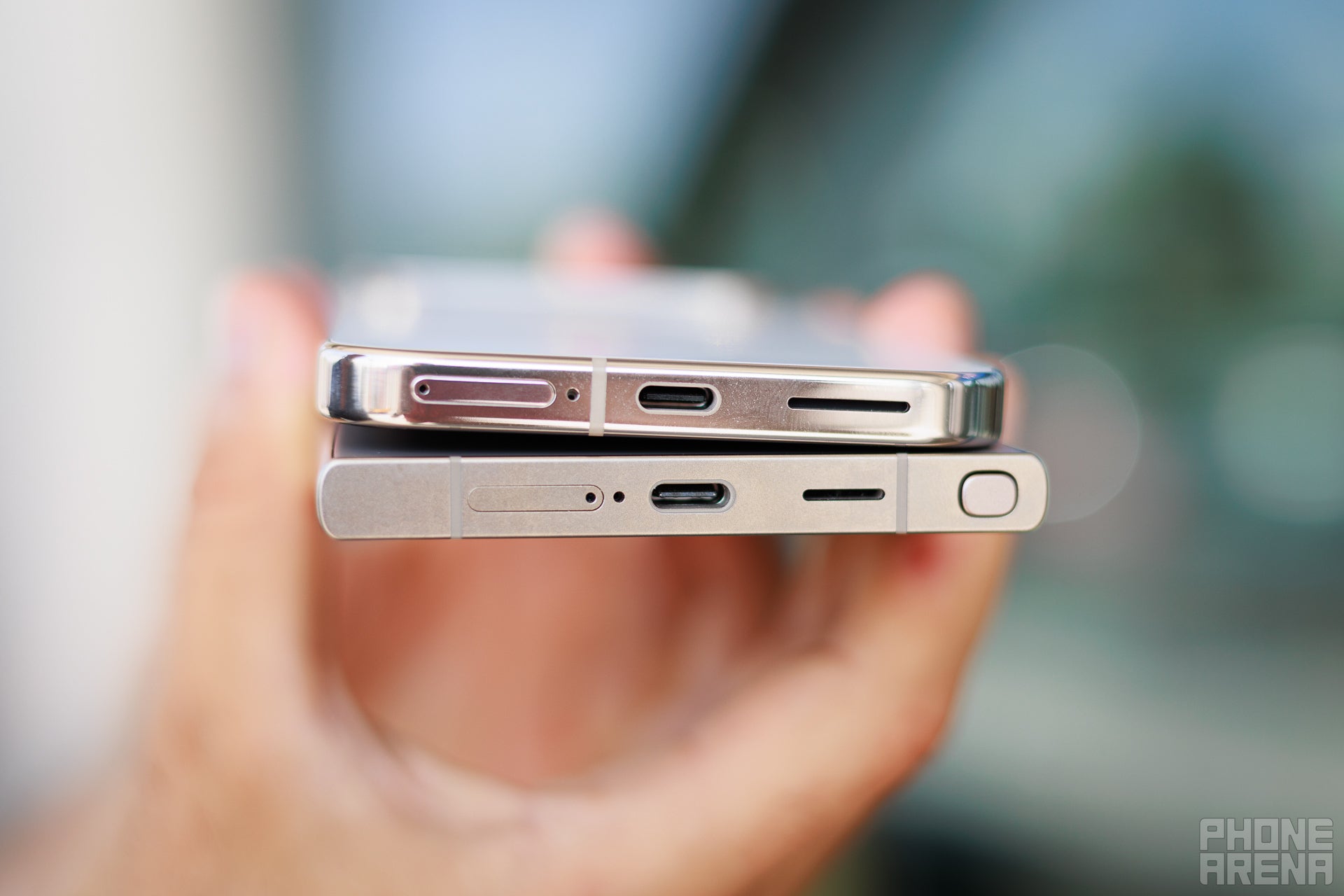

The Pixel 9 Pro XL comes with a 5,060mAh battery, which is just a negligible upgrade over the previous model’s 5,000mAh battery. Paired with the efficient Tensor G4, the next top Pixel phone should deliver excellent battery life, more likely than not better than the Pixel 8 Pro. Or, at least, we hope so!
PhoneArena Battery Test Results:
When it comes to our video streaming test, it’s the Pixel 9 Pro XL that beats the Galaxy S24 Ultra by more than an hour. However, in our last 3D gaming test, the Galaxy once again emerges victorious with a result of nearly 14 hours. The Pixel still lasts more than 10 hours, but can’t match the Snapdragon’s graphics efficiency.
In terms of charging, the Pixel 9 Pro XL comes with 37W wired and 23W wireless charging, with no charger in the box. The Galaxy S24 Ultra, which comes with 45W wired charging, could potentially charge faster. Wireless charging on the Samsung phone is slower, though.
PhoneArena Charging Test Results:
As per our charging test, the Pixel 9 Pro XL takes roughly 15 minutes longer to charge, which isn’t that much slower than the Galaxy. After charging either device for either 15 and 30 minutes, you get a bigger charge with the Samsung phone.
Specs Comparison
| Specs | Pixel 9 Pro XL | Galaxy S24 Ultra |
|---|---|---|
| Dimensions | 162.8 x 76.6 x 8.5mm | 161.2 x 74 x 8.6 mm |
| Weight | 221gr | 234 g |
| Screen | 6.8″ OLED HDR 1-120Hz 20:9 aspect ratio 2700-nit peak brightness |
6.8″ OLED 120Hz 2500 nits peak brightness |
| Processor | Google Tensor G4 | Snapdragon 8 Gen 3 (4nm) |
| RAM, Storage and Price | 16GB/128GB 16GB/256GB 16GB/512GB 16GB/1TB |
12/256GB 12/512GB 12/1TB LPDDR5 RAM |
| Cameras | Main: 50MP, f/1.68 Ultra-wide: 48MP, f/1.7 Telephoto: 48MP, f/2.8, 5x optical zoom Selfie camera: 42MP, f/2.2, AF |
200MP main 50MP telephoto 5X 10MP telephoto 3X 12MP ultra-wide 12MP front |
| Battery Size | 5,060 mAh | 5,000mAh |
| Charging Speeds | 37W wired 23W wireless |
45W wired 15W wireless |
Summary
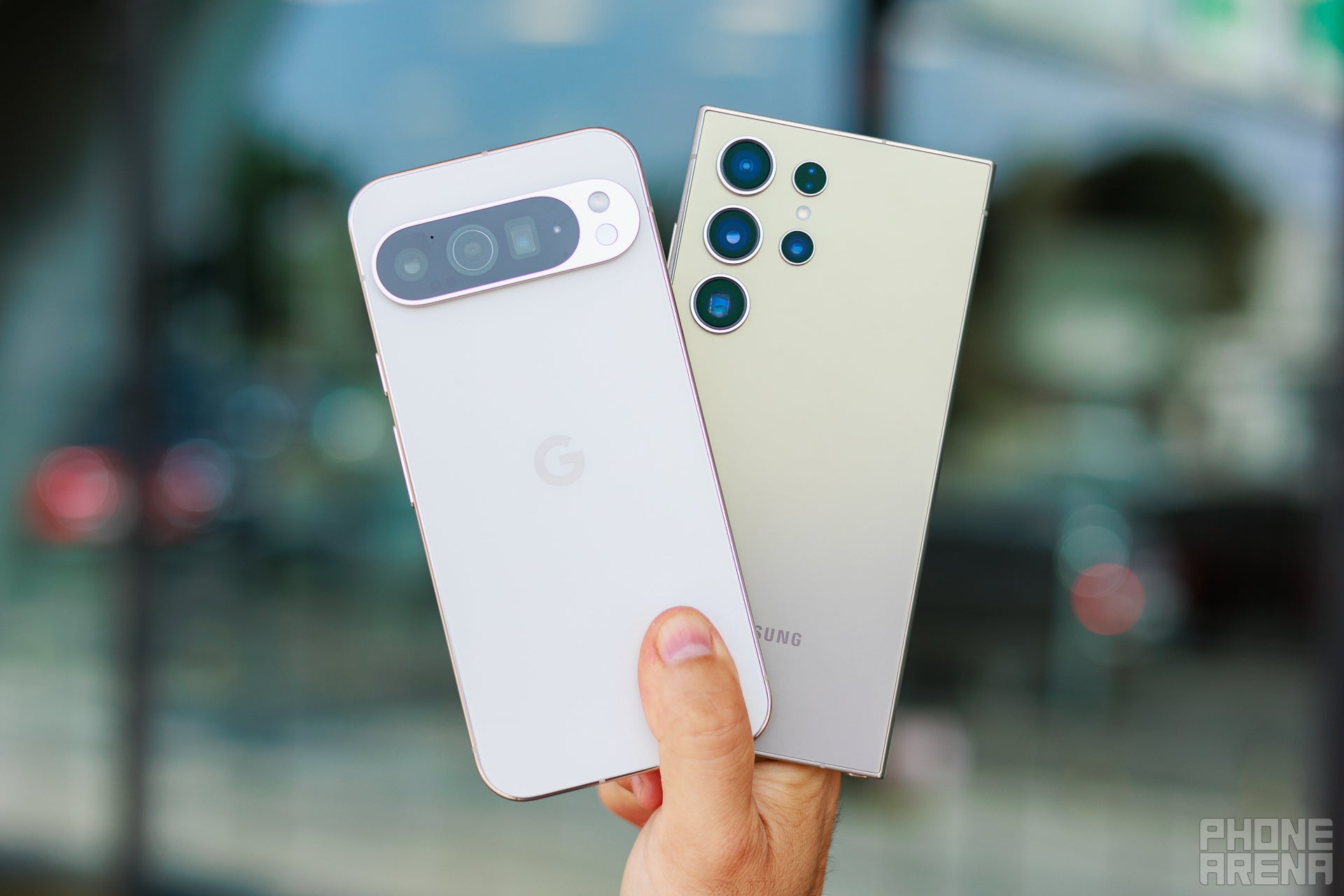

Valiant effort, but it’s difficult to beat the Galaxy S24 Ultra
The Pixel 9 Pro XL shapes to be the phone to get if you’re into AI in 2024, with sensible upgrades and notable improvements in most key areas that matter. With a fresher design, decent performance, a pretty great camera, and the best AI suite in late 2024, the Pixel 9 Pro XL is undoubtedly one of the best phones of 2024 so far.
Which one is better? Objectively speaking, it’s the Galaxy S24 Ultra that’s the better all-around phone that brings more versatility to the table. That’s better bang for the buck, and that’s what matter at the end of the day.
Source link


